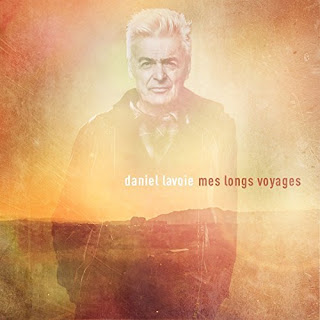Initially, however, the first word that came to mind was "brave". For the last few years one could observe at least two very different versions of Daniel Lavoie's persona: one, an extraordinary performer glowing and brimming with positive energy, existed on stage, and another, a dark and disillusioned philosopher, in his books of poetry. They rarely crossed paths, one could very well take them for two different people. This album merges them together, and the poet finally steps out of the shadows. As poetry is the most personal and intimate literary genre, the “new” Daniel of the MLV album reveals his most personal self. Before our very eyes we witness Daniel Lavoie break every stereotype about Daniel Lavoie that has existed for years. The new persona is older (by about 10 years than the real artist, but sometimes one has to exaggerate in order to get a point across), disillusioned, somber and… unabashedly bilingual. A gutsy move by an artist of impeccable taste.
The integrity of the album is remarkable. It is so well designed and put together, as if in one breath all of its parts – the concept, the music, the lyrics, the arrangements, the vocals - are woven together beautifully.* For that reason I would strongly recommend listening to the album as a whole, from beginning to end, at least initially.
Although as I've already noted, the album is remarkably coherent, structurally it consists of 3 parts: new songs by Daniel Lavoie, covers of classical songs by Léo Ferré, Alain Bashung, Allain Leprest and Félix Leclerc and two sonic pieces by Joseph Dubuc-Lavoie.
The so-called covers are excellent, because they are almost unrecognizable, completely owned by Lavoie, and to me that's the only way to do it. This said, I feel that there is a special purpose behind including them in this album (and no, that purpose is not to increase the commercial value). You see, they are the darkest pieces on the album: reimagined by Lavoie, Ferré’s Avec le temps leaves no doubt that “everything is over”, and even the young beloved from Félix Leclerc's Mes longs voyages turns into Lady Death… It feels as if the artist used the covers as a "cover" (in a different sense of this word, a cover as a mask) precisely in order to plunge into absolute darkness.
But things would be too simple if Daniel Lavoie ’s new album was all about darkness. No, Lavoie's own gift is made of light and love for humanity, and that's what shines through in his own songs.
All of his new songs on the album sound great musically, represent a variety of styles and will be enjoyed and hummed even by people who don't understand French or English. But the texts are very important and they are excellent. I would like in particular to mention Maman chantait les feuilles because it is one of those rarest of rare songs that deal with unique and utterly unpoetic subjects (I don’t know of any other songs written about one’s parent losing his or her memory). Lavoie finds a unique viewpoint here and it is deeply touching because it offers a way to look at darkness from the position of light, and that’s a survival skill that only poetry makes possible.
And finally, I love the sonic prologue and epilogue (both the idea to include them and their realization), especially Styxx - it's atmospheric, poignant, chilling and no doubt alludes to Kancheli's Styx, with splashes of music drowning forever…
But do, oh please do listen to the Deluxe edition’s C’est extra which truly concludes the album, with its full-fledged triumph of the power of life, even if only brought forth by a memory.
I won’t say much about Lavoie’s voice on this album, and all the things it does and how it makes everything happen... Just listen to the album.
I’ll conclude by saying that this somber and classy album does not seek to soothe or to console (or to merely entertain), but instead it looks courageously straight into the depths of human fears. In the face of the inevitable it finds what's most important about living, and by that alone it gives hope, and that’s what makes it so infinitely attractive. Lavoie acknowledges things we all go (or will go) through: yes, we all get old and lose relatives (and sometimes they leave us before physically leaving this world); yes, we are mortal and so are many of our dreams; yes, our love stories sometimes are sad; yes, we are susceptible to illusion; and yes, our little lives don’t matter as far as the universe is concerned; but at the same time, our roots have an amazing power to stay with us for life, to love is perhaps more important than to be loved, music is forever, and even though the world is too large and too cruel, inside every human being there is a fragile soul that needs love and tenderness, and the author of MLV generously shares his own love and tenderness with us, which to me is the essence of his truly unusual gift.
__________________________________
P. S. One must acknowledge a great effort by Guy St-Onge for his role in producing this album.
P. P. S. For my review of the live show Mes longs voyages produced in Spring 2017, peek here.

Unquestionably, the most clearly understood view of this album.
ReplyDeleteThank you so much for your kind words!
Delete